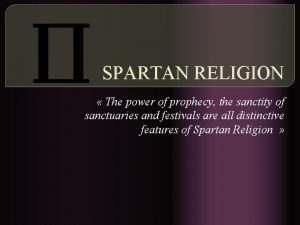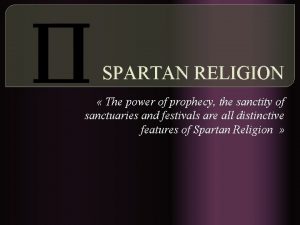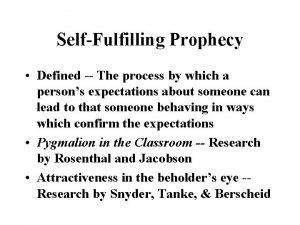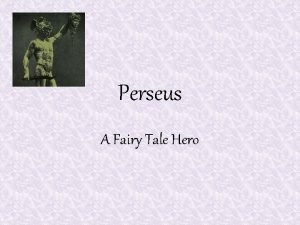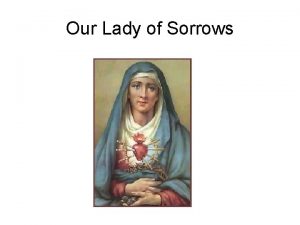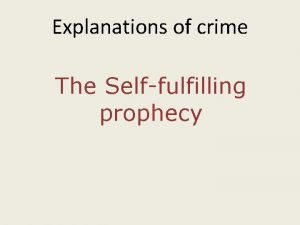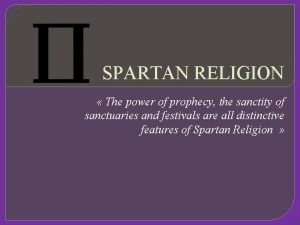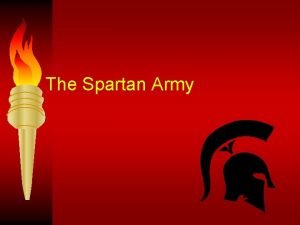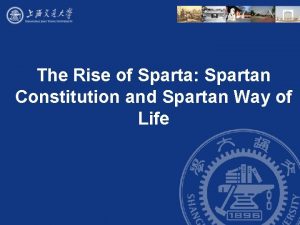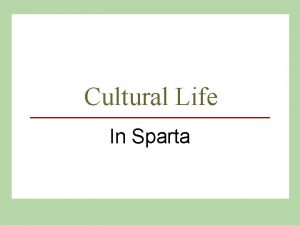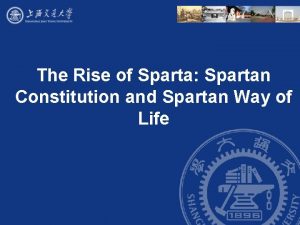SPARTAN RELIGION The power of prophecy the sanctity















- Slides: 15

SPARTAN RELIGION « The power of prophecy, the sanctity of sanctuaries and festivals are all distinctive features of Spartan Religion »

HSC STYLE QUESTIONS Describe one festival Explain the features of Spartan Religion Explain the role of Spartan Religion Discuss the importance of Spartan Religion

HERODOTUS Athenians telling the Spartans; “We are all Greeks sharing both the same blood and the same language and we have temples of our gods in common and our sacrifices. ” Sparta was the only Greek state to receive its Constitution from the Oracle at Delphi

Problems of Evidence While written sources such as Pausanius, Herodotus and Xenophon are essentially non Spartan and elite, much of our current knowledge has been gathered from the excavations of such sites as Artemis Orthia and the Menaleon

The three principal festivals all honour Apollo, the model youth” “ R. Parker

Athenians at Marathon The most unique aspect of Spartan religion was their strict adherence to religious ritual. “ The Spartans , though moved by appeal, and willing to send help to Athens, were unable to send it promptly because they did not wish to break their law. It was the ninth day of the month and they said they could not take to the field until the moon was full. ”

Characteristics of Spartan Religion Belief in Anthropomorphic gods Merging of Religious and Secular; Kings as Chief Priests and the worship of hero cults Belief and Importance of Oracles Importance of Ritual blood sacrifice Importance of competitive games and festivals Procession an important element of festivals

The Role of Religion 1. 2. 3. To explain the natural world and seek to control it. Fertility , both natural and human could be guaranteed by appeasing the gods at such festivals as the Karneia and the Hyakinthia To avert disaster by ritual sacrifice, libations and divination Gain advantage through war by the use of oracles and the protection of the Dioscuri

4 Religion reinforces social values. Hero worship, most often soldiers who had died in battle transmitted the values of bravery (Hero worship of Menelaus Leonidas) 5 Competition in festivals emphasized the importance of athleticism and physical fitness. ( Karneia) 6 Inclusiveness of festivals created a community identity, while exclusion from festivals defined ones inferior status ( Agemoi at Gymnopaedia) 7 Certain festivals provided rites of passage from adolescence to adult or warrior status ( stealing of the cheese)

Belief in Oracles Now, a four-year study of the area in the vicinity of the shrine is causing archaeologists and other authorities to revisit the notion that intoxicating fumes loosened the lips of the Pythia. The study, reported in the August issue of Geology, reveals that two faults intersect directly below the Delphic temple. The study also found evidence of hallucinogenic gases rising from a nearby spring and preserved within the temple rock The oracle was believed to be possessed by Apollo

Lycurgan Reform “ Firstly he did away with superstitions altogether by allowing them to bury bodies in the city itself and to have memorials in the vicinity of sacred places…. . Secondly he permitted nothing to be buried with them. However they covered the body with the scarlet cloak and olive leaves…It was not permitted to inscribe the name of the dead person on their tomb, unless it was a man who had died in war or a woman who had died in sacred office” *

Pthos burial at Limnai Fragment of a Pythos found at Sparta – 6 th century Near the river Eurotas, a male pithos burial was discovered with iron weapons, a sword and a dagger and bronze ornaments. It was dated to late 8 th century

Historians on Religion in Spartan Society “It is impossible to find any other advisors in such matters except gods. They know everything, and give signs to those they wish to through sacrifices, birds of omen, voices and dreams. ” Hipparchicus “The charm of divination for the consultant is that he may never feel that he is acting at random. ” Robert Parker

“ The power of prophecy, the sanctity of sanctuaries and festivals, the threat of divine punishment; it is on issues such as these that the distinctiveness of Spartan religion emerges. ” Robert Parker “The more an individual feels subject as a social being to a set of rules that he must obey without question, the more he is bound within a hierarchical structure of power, the more likely he is to understand religion too as a matter of fixed and formal observance, of strict obedience to rules. ” Mary Douglas

A FINAL SAY “Spartan religion was Spartan more in its insistence on orderliness and obedience than in any particular military emphasis it may have had…. Thus it contributed to her success by supporting the dominant norms of Spartan Society. ” Robert Parker
 Define sanctity of life
Define sanctity of life Sanctity of marriage definition
Sanctity of marriage definition Sparta religion
Sparta religion Spartan religion
Spartan religion Xilinx power estimator user guide
Xilinx power estimator user guide Secneer
Secneer Power trianlge
Power trianlge Self fulfilling prophecy psychology
Self fulfilling prophecy psychology What comes in your mind when you hear the word work
What comes in your mind when you hear the word work Theme statements about deception
Theme statements about deception Self-fulfilling prophecy
Self-fulfilling prophecy Self fulfilling prophecy example
Self fulfilling prophecy example Who is persus
Who is persus Prophecy of simeon
Prophecy of simeon Key quotes from macbeth
Key quotes from macbeth Self fulfilling prophecy
Self fulfilling prophecy


